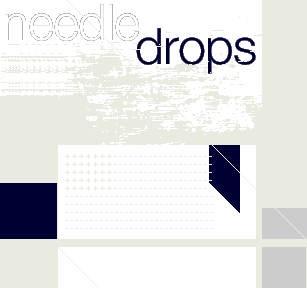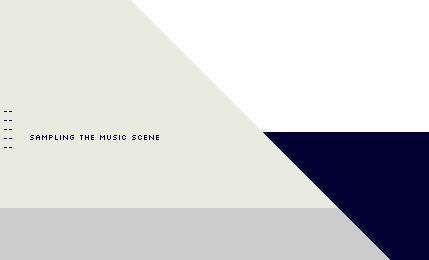


++ Contact Philip Sherburne ++
++ Recently ++
Tuesday, November 29, 2005 = The Stooges Unearthed (Again)
Tuesday, November 8, 2005 = Documenting Beulah And DCFC
Tuesday, November 1, 2005 = Out-Of-Control Rock 'N' Roll Is Alive And Well
Tuesday, October 25, 2005 = Just In Time For Halloween
Monday, October 3, 2005 = The Dandyesque Raunch Of Louis XI
Monday, August 15, 2005 = The Empire Blues
Tuesday, August 9, 2005 = David Howie's Sónar Diary
Monday, July 25, 2005 = Hot Sounds For Summertime
Monday, June 27, 2005 = Overcoming Writer's Block At Sónar 2005
Monday, June 4, 2005 = Cool New Sounds To Download Or Stream
++ Needle Drops Archives ++
View full list of Needle Drops articles...
|
|
 |
November 09, 2001
++ Rock Crit Snobbery And The (Continued) Subversiveness of Rock
++ I was emailing back and forth with a friend today about Ryan Adams' new
album, Gold. Wait, wait, don't click back; this is an electronic
music column, but that doesn't mean I don't have my guilty pleasures.
And that's exactly how Gold comes off to me. The slick production,
rough-edged vocals, and feel-good chord changes smack of classic rock. And
while I've always hated most classic rock — something about going to a
public high school where Led Zep and the Allman Brothers were gods, the
football team lorded like a ruling junta, and the only way to escape
the boneheaded culture of jocks and keggers was to go punk, or goth, or
straight-edge — something about Gold strikes just the right
chord. It makes me want to hit the road and sing my way across state line
after state line. Sure, it's a cliché, but who cares? I said this was
a guilty pleasure.
Anyway, my friend, knowing my staunch non-mainstream outlook, told me she
thought I'd prefer Adams' previous solo album, Heartbreaker, which
has a stronger alt-country edge. "Gold is more accessible," she
advised, "because it's less twangy."
But it was that accessibility that turned me on. "I actually like the FM
radio feel of Gold," I responded. "Very '70s rock, very mainstream,
but very good. I'm sure I'd like the country twang as much or better, but
Gold makes for a nice anomaly in my collection."
Her rejoinder gave me pause. "You are so John Cusack in 'High
Fidelity' right now!"
That made me nervous. When the film came out, enough people told me that I
just had to see the film — people like my parents, my best
friend, my ex-girlfriend — that it made me wonder. Obviously there was
something in the film that reminded them of me. Sure, I had worked in a
record store, was an unrepentant snob, and had a number of comically spotty
relationships in my past — that didn't make me a caricature, did it?
When I finally got around to seeing the movie and I realized that beneath
the Cusack character's obsessive but lovingly geeky demeanor, he was a
deeply insecure, deeply dysfunctional person, it occurred to me that perhaps
I should remove the title of "Obscurantist Extraordinaire" from my business
cards, lest it hold back my personal development. So when I heard the charge
levied against me again, I naturally grew defensive. But my friend reassured
me: "It's your use of the word 'collection' regarding your music. I can't
speak for you on the relationship side (I'll let your ex handle that) but as
for music — very 'High Fidelity.' "
That made me laugh — even at my most mainstream, it turned out I was
falling into the same old habits of record-store-clerk snobbery. Well, at
least I'm consistent.
++ But is there anything wrong with snobbery? I ask because a few times
recently I've been given cause to wonder if I am, truly, a snob — and
if so, if it's such a bad thing. A few weeks ago I found myself at a popular
Wednesday happy-hour weekly in San Francisco's SOMA neighborhood, where
trance and hard house are the rule. As far as I'm concerned, the music is as
bad as it gets — pummeling beats lacking in subtlety, obvious builds
and climaxes, all the clichés of lowest-common-denominator dance
music. Oddly, the music's proximity to the dance music I do love makes it
all the worse. Both rely on similar forms — 4/4 beats, sampled sounds,
musical figures formulated to make bodies move. But to my mind, the music I
think is important goes an extra distance, transcends its formula, suggests
alternate possibilities. The crap, on the other hand, I find boring,
predictable and retrograde in its mediocrity.
I tried explaining this to the friend who'd accompanied me, but she shot me
down. "If these people are having fun with it, what's wrong with it?" She
was right, of course — who am I to criticize a culture? I grasped for
reasons — with the lack of venues in SF for good music, it wasn't right
that this music was finding a home at the expense of better work. She shot
me down again — wasn't it true that this weekly, through the
combination of the promoters' hard work and the audience's obvious
enthusiasm, drew many more people than would an event more germane to my
tastes?
Well, yes, she had me again. But I'm not so easily swayed. Especially in a
culture that privileges the "democracy" of taste, judgments that cut against
the popular, or "populist," inclination are often disregarded as elitist.
But I've always believed that aesthetics embodies an ethics; that obvious,
boring, unadventurous music fosters an obvious, boring, unadventurous
society.
I certainly don't have it all figured out — one listener's "boring" is
another's epiphany, and I'm not about to play Kant and establish a
categorical imperative for dance music. I'll never endorse the disdain of
Cusack's coworker in "High Fidelity" who attacks a customer who comes
looking for a Lionel Richie record for his daughter's birthday, asking
disdainfully, "Is she in a coma?" There's no need for cruelty, but at the
same time, in a culture dominated by corporations with a vested interest in
lowering our expectations for art, I believe that critics have an obligation
to make those alternate possibilities their priority.
++ That doesn't mean, though, that an "alternate possibility" has to be
obscure, or difficult, or unlistenable. Even guilty pleasures provide their
own alternate possibilities, as did Ryan Adams for me this weekend when I
found myself stuck at a corporate "management training" retreat for three
days, satisfying the demands of my day job. Sequestered away up in Tomales
Bay, a breathtaking area north of San Francisco where the fog plastered over
a long peninsula and oyster beds dotted the bay, we were stuck in conference
rooms staring at whiteboards while the landscape teased us from outside.
On a late afternoon as the light was dying, I found exactly one hour to
sneak away from the proceedings, so I grabbed my CD player, snapped
Gold in the tray and headed down a trail for the water. I sprawled
out on a picnic bench staring out over the steely bay, and Adams' down-home
porch music seemed to fit the setting perfectly. A flock of migrating birds
skimmed the water in a low "V." A black spot that I hoped was a seal or an
otter bobbed up every now and then, a speck against the light-flecked
ripples on the water.
Spartan, rustic boats lay at anchor. After a time, I sensed movement behind
me, and turned warily around, expecting to see a coworker. It was just a
deer (as though there were any such thing as just a deer!), head
lowered to munch at ground cover, staring at my odd, denim-covered figure,
doubtless wondering what that weird warbling sound was. (If she'd known
anything about rock music, of course — which is doubtful — she
would have recognized it as my own vocally impaired accompaniment to Adams'
recording. Out of respect for the ecosystem, I quelled my yelps until she
had walked on.)
Any number of the thousands of CDs in my collection would have made a
perfect accompaniment to the setting, of course, but at the time Adams'
music seemed perfectly suited to the moment: his roots Americana, flush with
organs and bluesy guitars, proclaimed an expansiveness, a vision of freedom
that fit with the unconstrained sense of space. Rock's self-proclaimed
subversiveness was reborn for me in this moment — it didn't matter that
I was listening to a major-label album, or that Adams' dialect of the rock
idiom, with its hearty harmonies and easy resolutions, was safe as milk. I'd
snuck out of my white-collar confinement to find a sense of freedom,
grounded in the landscape and magnified by music that seemed to proclaim,
"I will not be tamed."
|
| |
|